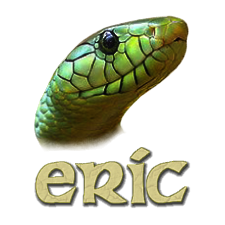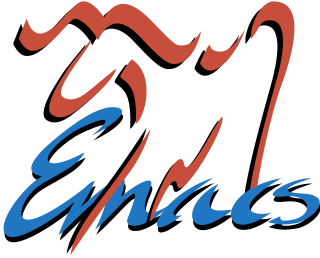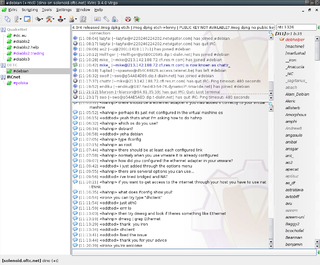
Character encoding is the process of assigning numbers to graphical characters, especially the written characters of human language, allowing them to be stored, transmitted, and transformed using digital computers. The numerical values that make up a character encoding are known as "code points" and collectively comprise a "code space", a "code page", or a "character map".

Cygwin is a Unix-like environment and command-line interface for Microsoft Windows. Cygwin's purpose is expressed in its motto: "Get that Linux feeling – on Windows".

The GNU Compiler Collection (GCC) is an optimizing compiler produced by the GNU Project supporting various programming languages, hardware architectures and operating systems. The Free Software Foundation (FSF) distributes GCC as free software under the GNU General Public License. GCC is a key component of the GNU toolchain and the standard compiler for most projects related to GNU and the Linux kernel. With roughly 15 million lines of code in 2019, GCC is one of the biggest free programs in existence. It has played an important role in the growth of free software, as both a tool and an example.

The GNU Debugger (GDB) is a portable debugger that runs on many Unix-like systems and works for many programming languages, including Ada, C, C++, Objective-C, Free Pascal, Fortran, Go, and partially others.
An integrated development environment (IDE) is a software application that provides comprehensive facilities to computer programmers for software development. An IDE normally consists of at least a source code editor, build automation tools, and a debugger. Some IDEs, such as NetBeans and Eclipse, contain the necessary compiler, interpreter, or both; others, such as SharpDevelop and Lazarus, do not.

UTF-16 (16-bit Unicode Transformation Format) is a character encoding capable of encoding all 1,112,064 valid code points of Unicode (in fact this number of code points is dictated by the design of UTF-16). The encoding is variable-length, as code points are encoded with one or two 16-bit code units. UTF-16 arose from an earlier obsolete fixed-width 16-bit encoding, now known as UCS-2 (for 2-byte Universal Character Set), once it became clear that more than 216 (65,536) code points were needed.

GNAT is a free-software compiler for the Ada programming language which forms part of the GNU Compiler Collection (GCC). It supports all versions of the language, i.e. Ada 2012, Ada 2005, Ada 95 and Ada 83. Originally its name was an acronym that stood for GNU NYU Ada Translator, but that name no longer applies. The front-end and run-time are written in Ada.

Mojibake is the garbled text that is the result of text being decoded using an unintended character encoding. The result is a systematic replacement of symbols with completely unrelated ones, often from a different writing system.

Windows-1252 or CP-1252 is a single-byte character encoding of the Latin alphabet that was used by default in Microsoft Windows for English and many Romance and Germanic languages including Spanish, Portuguese, French, and German. This character-encoding scheme is used throughout the Americas, Western Europe, Oceania, and much of Africa. All modern operating systems, including Windows, now use Unicode code points and text encodings by default, which are portable across all of the world's major languages.
In Unix and Unix-like operating systems, iconv is a command-line program and a standardized application programming interface (API) used to convert between different character encodings. "It can convert from any of these encodings to any other, through Unicode conversion."
This article provides basic comparisons for notable text editors. More feature details for text editors are available from the Category of text editor features and from the individual products' articles. This article may not be up-to-date or necessarily all-inclusive.

eric is a free integrated development environment (IDE) used for computer programming. Since it is a full featured IDE, it provides by default all necessary tools needed for the writing of code and for the professional management of a software project.

Komodo Edit is a free and open source text editor for dynamic programming languages. It was introduced in January 2007 to complement ActiveState's commercial Komodo IDE. As of version 4.3, Komodo Edit is built atop the Open Komodo project. Komodo IDE is no longer supported and maintained by developers for Python.
HTMLDOC is a previously commercially developed open-source program that converts HTML and Markdown web pages and files to EPUB, indexed HTML, PostScript, and PDF files, complete with a table of contents. HTMLDOC can be used from the command line, a simple GUI, or from a web server. Development originally occurred through the author's now-defunct business, Easy Software Products, and now continues on the author's personal web site.

GNU Emacs is a free software text editor. It was created by GNU Project founder Richard Stallman, based on the Emacs editor developed for Unix operating systems. GNU Emacs has been a central component of the GNU project and a flagship project of the free software movement. Its name has occasionally been shortened to GNUMACS. The tag line for GNU Emacs is "the extensible self-documenting text editor".

KVIrc is a graphical IRC client for Linux, Unix, Mac OS and Windows. The name is an acronym of K Visual IRC in which the K stands for a dependency to KDE, which became optional from version 2.0.0. The software is based on the Qt framework and its code is released under a modified GNU General Public License.

Pluma is a fork of gedit 2 and the default text editor of the MATE desktop environment used in Linux distributions. It extends the basic functionality with other features and plugins.
Although C++ is one of the most widespread programming languages, many prominent software engineers criticize C++ for being overly complex and fundamentally flawed. Among the critics have been: Robert Pike, Joshua Bloch, Linus Torvalds, Donald Knuth, Richard Stallman, and Ken Thompson. C++ was widely adopted and implemented as a systems language through most of its existence, it has been used to build many pieces of very important software.












